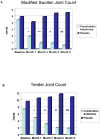Combination antibiotics as a treatment for chronic Chlamydia-induced reactive arthritis: a double-blind, placebo-controlled, prospective trial
- PMID: 20155838
- PMCID: PMC2907099
- DOI: 10.1002/art.27394
Combination antibiotics as a treatment for chronic Chlamydia-induced reactive arthritis: a double-blind, placebo-controlled, prospective trial
Abstract
Objective: Chlamydia trachomatis and Chlamydophila (Chlamydia) pneumoniae are known triggers of reactive arthritis (ReA) and exist in a persistent metabolically active infection state in the synovium, suggesting that they may be susceptible to antimicrobial agents. The goal of this study was to investigate whether a 6-month course of combination antibiotics is an effective treatment for patients with chronic Chlamydia-induced ReA.
Methods: This study was a 9-month, prospective, double-blind, triple-placebo trial assessing a 6-month course of combination antibiotics as a treatment for Chlamydia-induced ReA. Eligible patients had to be positive for C trachomatis or C pneumoniae by polymerase chain reaction (PCR). Groups received 1) doxycycline and rifampin plus placebo instead of azithromycin; 2) azithromycin and rifampin plus placebo instead of doxycycline; or 3) placebos instead of azithromycin, doxycycline, and rifampin. The primary end point was the number of patients who improved by 20% or more in at least 4 of 6 variables without worsening in any 1 variable in both combination antibiotic groups combined and in the placebo group at month 6 compared with baseline.
Results: The primary end point was achieved in 17 of 27 patients (63%) receiving combination antibiotics and in 3 of 15 patients (20%) receiving placebo. Secondary efficacy end points showed similar results. Six of 27 patients (22%) randomized to combination antibiotics believed that their disease went into complete remission during the trial, whereas no patient in the placebo arm achieved remission. Significantly more patients in the active treatment group became negative for C trachomatis or C pneumoniae by PCR at month 6. Adverse events were mild, with no significant differences between the groups.
Conclusion: These data suggest that a 6-month course of combination antibiotics is an effective treatment for chronic Chlamydia-induced ReA.
Trial registration: ClinicalTrials.gov NCT00351273.
Figures

Comment in
-
Combination antibiotics for Chlamydia-induced arthritis: breakthrough to a cure?Arthritis Rheum. 2010 May;62(5):1203-7. doi: 10.1002/art.27401. Arthritis Rheum. 2010. PMID: 20155826 No abstract available.
-
Combination treatment in Chlamydia-triggered reactive arthritis: comment on the article by Carter et al.Arthritis Rheum. 2011 Jan;63(1):305-7; author reply 307-8. doi: 10.1002/art.30075. Arthritis Rheum. 2011. PMID: 20936631 No abstract available.
Similar articles
-
Doxycycline versus doxycycline and rifampin in undifferentiated spondyloarthropathy, with special reference to chlamydia-induced arthritis. A prospective, randomized 9-month comparison.J Rheumatol. 2004 Oct;31(10):1973-80. J Rheumatol. 2004. PMID: 15468362 Clinical Trial.
-
Comparing 10-day and 4-month doxycycline courses for treatment of Chlamydia trachomatis-reactive arthritis: a prospective, double-blind trial.Ann Rheum Dis. 2006 Nov;65(11):1521-4. doi: 10.1136/ard.2005.045484. Ann Rheum Dis. 2006. PMID: 17038453 Free PMC article. Clinical Trial.
-
The role of Chlamydia and Chlamydophila infections in reactive arthritis.Intern Med. 2012;51(1):113-7. doi: 10.2169/internalmedicine.51.6228. Epub 2012 Jan 1. Intern Med. 2012. PMID: 22214635
-
Molecular biology of infectious agents in chronic arthritis.Rheum Dis Clin North Am. 2009 Feb;35(1):1-19. doi: 10.1016/j.rdc.2009.03.011. Rheum Dis Clin North Am. 2009. PMID: 19480994 Review.
-
Antibiotics for treating urogenital Chlamydia trachomatis infection in men and non-pregnant women.Cochrane Database Syst Rev. 2019 Jan 25;1(1):CD010871. doi: 10.1002/14651858.CD010871.pub2. Cochrane Database Syst Rev. 2019. PMID: 30682211 Free PMC article.
Cited by
-
Poncet's Disease (Reactive Arthritis Associated with Tuberculosis).Intern Med. 2022 Nov 1;61(21):3245-3249. doi: 10.2169/internalmedicine.9241-21. Epub 2022 Mar 26. Intern Med. 2022. PMID: 35342140 Free PMC article.
-
Microbes, helminths, and rheumatic diseases.Best Pract Res Clin Rheumatol. 2020 Aug;34(4):101528. doi: 10.1016/j.berh.2020.101528. Epub 2020 May 7. Best Pract Res Clin Rheumatol. 2020. PMID: 32448639 Free PMC article. Review.
-
Infection and Atherosclerosis Development.Arch Med Res. 2015 Jul;46(5):339-50. doi: 10.1016/j.arcmed.2015.05.006. Epub 2015 May 21. Arch Med Res. 2015. PMID: 26004263 Free PMC article. Review.
-
Combination antibiotics for the treatment of Chlamydia-induced reactive arthritis: is a cure in sight?Int J Clin Rheumtol. 2011 Jun;6(3):333-345. doi: 10.2217/ijr.11.20. Int J Clin Rheumtol. 2011. PMID: 21853013 Free PMC article.
-
Advances in the treatment of inflammatory arthritis.Best Pract Res Clin Rheumatol. 2012 Apr;26(2):251-61. doi: 10.1016/j.berh.2012.03.001. Best Pract Res Clin Rheumatol. 2012. PMID: 22794097 Free PMC article. Review.
References
-
- Carter JD, Hudson AP. Reactive Arthritis: Clinical Aspects and Medical Management. Rheum Dis Clin North Am. 2009;35(1):21–44. - PubMed
-
- Hannu T, Puolakkainen M, Leirisalo-Repo M. Rheumatology (Oxford) 5. Vol. 38. 1999. Chlamydia pneumoniae as a triggering infection in reactive arthritis; pp. 411–4. - PubMed
-
- Manavi K. A review on infection with Chlamydia trachomatis. Best Pract Res Clin Obstet Gynaecol. 2006;20(6):941–51. - PubMed
-
- Miyashita N, Niki Y, Nakajima M, Fukano H, Matsushima T. Prevalence of asymptomatic infection with Chlamydia pneumoniae in subjectively healthy adults. Chest. 2001;119(5):1416–9. - PubMed
Publication types
MeSH terms
Substances
Associated data
Grants and funding
LinkOut - more resources
Full Text Sources
Other Literature Sources
Medical

